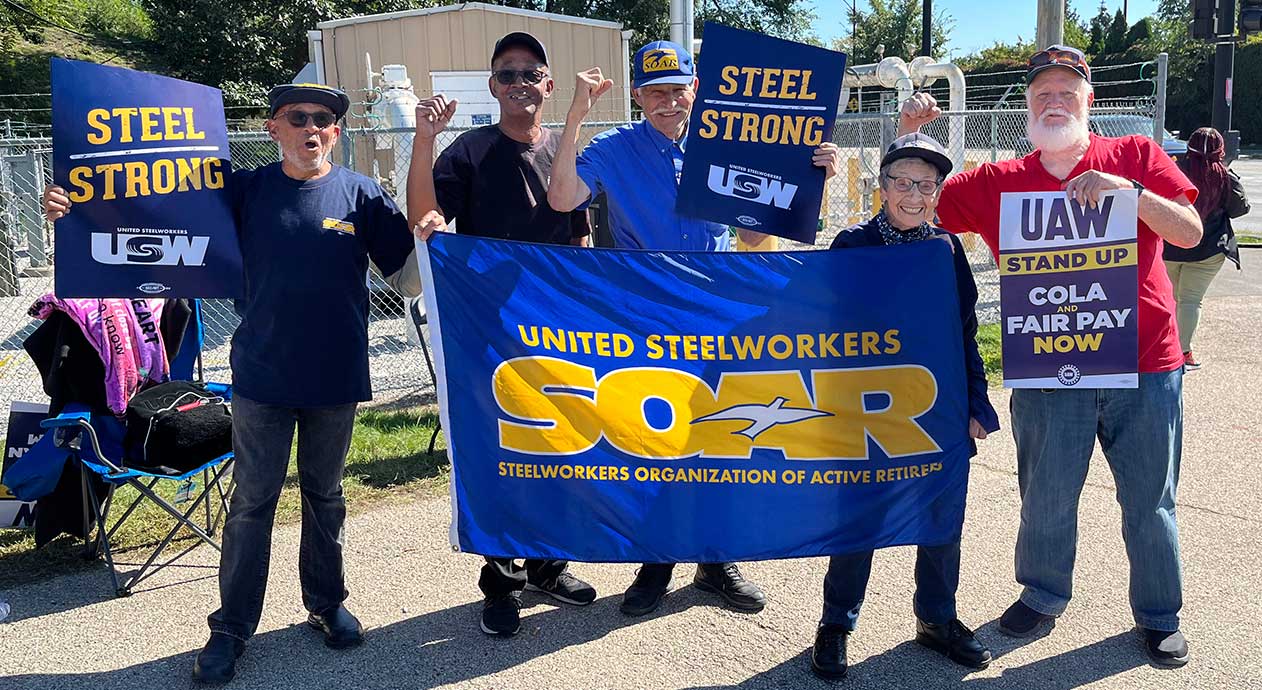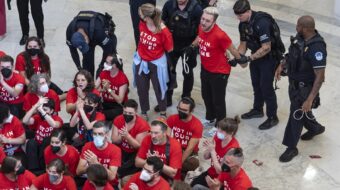
CHICAGO HEIGHTS, Ill.—Across the country a wave of strikes has grown to tsunami proportions with some 300,000 workers now out on strike and walking the picket lines. One of those strikes, the walkout by 75,000 healthcare workers, is the largest such action in that industry in the nation’s history.
Meanwhile, the historic strike by auto workers has continued with that walkout impacting all kinds of related industries from coast to coast. Part of what is happening there is supply chain ripples all over the country. It is clear that the 300,000 out on strike and workers generally are fed up with corporate greed which has put them in a place where they either just barely get by or often don’t get by at all.
The role is getting longer, with the total soaring close to 300,000 workers, from Detroit to New York to Los Angeles to San Francisco and on and on:
Some 25,000 UAW members are officially on strike against the Detroit 3, while at least 3,700 more are out at parts plants the firms closed because they are not getting needed parts from the places where workers are out on the picket lines. The massive coast-to-coast operation by UAW members is part of the UAW’s “Stand Up!” designed to keep the car companies off balance.
Among the 3,700 UAW workers that most recently joined the walkout of thousands of their brothers and sisters are the 243 workers at Ford’s Chicago Heights, Ill., stamping plant and 90 more at its Lima, Ohio, Ford idled both, saying those workers sent engines and parts to its giant SUV assembly plant on Chicago’s South Side. The UAW’s bargainers first called the South Side’s 4,600 workers out on September 30.
Another 400 workers combined at Ford’s Livonia, Mich., transmission plant and Sterling, Mich., axle plant were told late on October 4 that they were laid off as of the start of the next day. Those plants, too, supply the main Chicago South Side plant, Ford said.
GM, blaming the union, idled 2,600 parts plant workers in the suburbs of Kansas City, Kansas. The K.C. workers sent parts to the GM plant in Wentzville, Mo., one of the first three plants whose UAW members the union bargainers sent out the night the strike started, at midnight September 14-15.
Some 75,000 healthcare workers—support staffers, pharmacists, lab techs, and others—all members of the 12-local Coalition of Kaiser Permanente Unions are in the largest healthcare strike in U.S. history. They’re out from October 4-6.
“Kaiser Permanente workers in multiple states are now on strike to protest unfair labor practices and Kaiser executives’ failure to bargain in good faith over unsafe staffing levels at hundreds of Kaiser hospitals and facilities across the United States,” CKPU said.
Highly profitable Kaiser Health is offering skimpy raises to already low-paid workers even though its hospitals and clinics are concentrated in high-cost metro areas such as Los Angeles, San Francisco, Portland Oreg., Denver, Boston, D.C., and Honolulu.
The Kaiser strike follows “months of bad faith bargaining activity by Kaiser executives and repeated appeals by frontline healthcare workers for Kaiser executives to make the kinds of investments in staffing that could help stem employee turnover and reduce growing patient wait times.” CKPU is charging Kaiser with unfair labor practices, a decision up to the National Labor Relations Board.
Refuse to listen
“Kaiser executives are refusing to listen to us and are bargaining in bad faith over the solutions we need to end the Kaiser short-staffing crisis,” Jessica Cruz, a licensed vocational nurse at Kaiser Los Angeles Medical Center told CKPU. “I see my patients’ frustrations when I have to rush them and hurry on to my next patient. That’s not the care I want to give. We’re burning ourselves out trying to do the jobs of two or three people, and our patients suffer when they can’t get the care they need due to Kaiser’s short-staffing.”
More than 14,000 UNITE HERE Local 11 members in Los Angeles are out on a series of rolling strikes against dozens of L.A. and Orange County, California hotels, including the historic Fairmont Century Plaza, the Beverly Hilton, and the Waldorf Astoria. Two of the hotels, with 600 workers combined, have settled: the Biltmore Los Angeles and the Westin Bonaventure. At both, the local achieved its goals.
“My coworkers and I have given years of service making the beds, cooking the food, and washing the dishes of those who visit Beverly Hills, yet we cannot afford to provide for our families. I am on strike because we deserve our fair share,” Waldorf Astoria housekeeper Lucero Ramirez said.
Key issues for Local 11, at all the hotels, are “unprecedented wage increases that keep pace with the soaring cost of housing” in high-cost L.A., affordable family health care, humane workloads and safe staffing for all workers, better pensions and equal justice language—including hotel commitments to hire previously incarcerated people to not use the highly unreliable federal E-verify system to screen workers’ migration status. The struck Biltmore Hotel has settled.
“It is great to see our contribution recognized and our compensation increased. This agreement will allow us to go home and sleep a bit more securely,” Biltmore housekeeper Lucy Mijangos told Local 11. Said local co-president, Kurt Petersen. “This agreement takes steps to ensure that workers who work in LA will be able to live in LA.”
The nation’s 160,000 SAG-AFTRA members still walk picket lines from New York to Los Angeles against their TV, movie, stage, Netflix, and streaming video bosses of the Alliance of Motion Picture and Television Professionals. Talks have resumed in that months-long strike.
Key issues are low pay, disappearing residuals, and AMPTP bosses’ eagerness to cut costs through the overwhelming use of computer-generated artificial intelligence as a replacement for real people. AI can craft the image, mannerisms, voice, and character of a performer in a one-day session then let the bosses duplicate and use it forever without paying the performer a penny.
Back in Detroit—and Chicago Heights—other factors are working in UAW’s favor: High public support and a financial warning from teachers’ union pension funds that hold GM, Ford, and Stellantis stock, to settle in the striking workers’ favor. The Chicago Heights workers are members of union Local 588, which represents 1,000 workers. Ford is the company that also laid off 90 workers at its Lima, Ohio, engine plant.
In preparing to manufacture SUVs, particularly the Ford Explorer, their prime product, Ford spent $1 billion four years ago to completely remake and upgrade the Chicago Assembly. Its workers had manufactured the Ford Taurus. Ford spent another $200 million for a remake at Chicago Heights, so workers there could supply SUV parts.
Chicago Heights and Lima are not the first supply plants to close because the parts they ship went to a plant the union bargaining team called out as part of its “Stand up!” strike strategy.
The public blames not UAW, but the Detroit 3, an opinion poll UAW released shows. It reported 78% support for the strike, including 69%-31% among Republicans. The big reason is the workers’ fight against corporate greed.
Navigator Research added that 85% of African-American and Asian-American respondents, as do three out of four whites, support the workers.
Singled out corporate greed
The UAW has singled out corporate greed and profits over the last decade, $251 billion at the Detroit 3 combined, as a key theme in its campaign to recoup the financial losses Auto Workers suffered over the last decade. Auto firm bosses pocketed millions of dollars each, yearly, while Wall Street financiers walked away with $20 billion in gains from stock buybacks alone. Meanwhile, workers’ pay, adjusted for inflation, declined.
Those financiers’ gains could become losses, as are union pension funds invested in GM, Ford, and Stellantis stock, Teachers President Randi Weingarten told the CEOs of the Detroit car companies—unless the strike is settled soon on terms favorable to the workers.
She added she’s advising her pension funds’ trustees to review their holdings in the auto companies.
“Our members’ pension funds own over $650 million in General Motors stock—$650 million in workers’ retirement savings now at risk due to GM’s unwillingness, so far, to bargain a fair contract,” Weingarten wrote GM CEO Mary Parra. Letters with identical language, but different stockholding figures, went to Ford’s CEO and Netherlands-based Stellantis’s general counsel.
“Our members’ pension funds have a fiduciary duty to manage our retirement assets in the long-term, risk-adjusted best interest of our members as plan participants,” Weingarten continued. “Significant research shows companies that prioritize constructive labor relationships and sound labor practices make for more stable—and more profitable—investments over the long term.
“Companies that fail to ensure fair working conditions for their workforce face financial, legal, and reputational risks, which in turn puts our members’ retirement assets at risk,” Weingarten warned. She added she sent copies of her letters to the CEOs to her unions’ pension trustees.
“Given the close cooperation between your major global competitors and their governments, the path of conflict with your workforce and with the Biden administration seems likely to place GM at a major global competitive disadvantage.
“As the strike wears on, the deferred wages of AFT members invested in GM are put increasingly at risk, as are the future prospects of your company, an important employer in many communities AFT members serve,” Weingarten said.
“As a union of working people, the AFT stands with striking GM workers. As long-term investors, our pension funds are exposed both to the mounting risks of a prolonged strike and to GM management’s pursuit of a shortsighted strategic approach at our expense.”
Weingarten’s letter may not be the last financial warning to the Detroit car companies to settle fast and favorably with the UAW. Two other big fiduciaries for union pension funds have yet to be heard from on the strike’s impact on their members’ investments.
New York City Comptroller Brad Lander, who has issued similar letters before, has yet to do so in the UAW strike. People’s World e-mailed a request for comment. The CALPERS (California Public Employee Retirement System) board met the day after the UAW strike began, but the strike and its impact did not come up, according to a video of the session.












Comments